
BULLETIN OF ENVIRONMENTAL CONTAMINATION AND TOXICOLOGY
metrics 2024
Illuminating the path to safer, cleaner environments.
Introduction
BULLETIN OF ENVIRONMENTAL CONTAMINATION AND TOXICOLOGY, published by SPRINGER, is a pivotal journal in the fields of Environmental Science, Toxicology, and Public Health. With a strong history of dissemination since its inception in 1966, the journal predominantly focuses on the latest advances in understanding environmental contaminants and their toxicological effects on health and ecosystems. It currently holds a respectable Q2 ranking across multiple categories including Health, Toxicology and Mutagenesis, Medicine (miscellaneous), and Pollution, as per the 2023 metrics. While the journal is not Open Access, it provides an invaluable platform for researchers, professionals, and students seeking to contribute to and stay informed on critical issues regarding environmental hazards and their implications. With an engaged community of scholars and practitioners, this journal continues to be an essential resource for addressing the pressing challenges of environmental contamination and its health impacts, guiding future research and policy decisions.
Metrics 2024
 0.67
0.67 2.70
2.70 2.60
2.60 86
86Metrics History
Rank 2024
Scopus
IF (Web Of Science)
JCI (Web Of Science)
Quartile History
Similar Journals
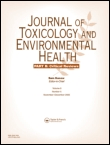
JOURNAL OF TOXICOLOGY AND ENVIRONMENTAL HEALTH-PART B-CRITICAL REVIEWS
Innovative reviews shaping the future of toxicology.Welcome to the JOURNAL OF TOXICOLOGY AND ENVIRONMENTAL HEALTH-PART B-CRITICAL REVIEWS, a prestigious publication under TAYLOR & FRANCIS INC based in the United Kingdom. With an impressive impact factor and ranked in the Q1 category for both Health, Toxicology and Mutagenesis, and Toxicology, this journal provides critical insights into the fields of toxicology and environmental health. Since its inception in 1998, it has become a key resource for researchers, professionals, and students, offering rigorous peer-reviewed articles that synthesize and critically appraise current knowledge in the discipline. The journal is recognized globally, ranking #5 in Toxicology and #12 in Environmental Science according to Scopus, highlighting its crucial role in advancing research and understanding in these essential areas. The journal also embraces open access options, making it easier for a broader audience to access vital research findings. Engage with the latest developments and critical analyses that are shaping the future of environmental health and toxicology by exploring our comprehensive collection of reviews and articles.

Reviews of Environmental Contamination and Toxicology
Advancing knowledge in environmental health and toxicology.Reviews of Environmental Contamination and Toxicology is a leading journal published by SPRINGER, dedicated to advancing the understanding of environmental science, toxicology, and public health. Since its inception in 1987, this esteemed journal has established itself as an invaluable resource for researchers and practitioners alike, showcasing a wealth of peer-reviewed articles that delve into the complexities of environmental contaminants and their effects on human health and ecosystems. With an impressive impact factor and consistently ranking in the Q1 category across multiple fields including Health, Toxicology and Mutagenesis, as well as Public Health, this journal commands attention, boasting Scopus rankings that place it among the top-tier publications globally. Researchers will find that the journal provides not only in-depth reviews but also practical implications for policy and practice regarding environmental issues. Located in the heart of New York, Reviews of Environmental Contamination and Toxicology is poised to remain at the forefront of this critical field through 2024 and beyond, making it an essential addition to the library of any environmental health scholar or practitioner.
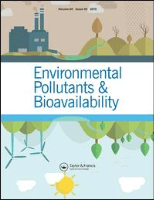
Environmental Pollutants and Bioavailability
Advancing Research on Pollutants and BioavailabilityEnvironmental Pollutants and Bioavailability, published by Taylor & Francis Ltd, serves as a critical platform for disseminating high-quality research focused on the interactions between environmental contaminants and biological systems. Since its inception as an Open Access journal in 2019, it has rapidly gained recognition within the scientific community, achieving a commendable Q2 ranking in multiple categories including Chemical Health and Safety, Health, Toxicology and Mutagenesis, and Toxicology for the year 2023. The journal aims to bridge the gap between environmental science and public health by exploring innovative methodologies, risk assessments, and bioavailability studies related to pollutants. Located in the United Kingdom, Environmental Pollutants and Bioavailability is positioned to impact ongoing discourse and research practices in the fields of toxicology and environmental safety, making it an invaluable resource for researchers, professionals, and students dedicated to advancing knowledge in these critical areas.
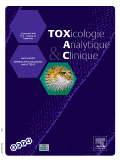
Toxicologie Analytique et Clinique
Shaping Tomorrow’s Toxicology Through Rigorous AnalysisToxicologie Analytique et Clinique is a distinguished journal published by ELSEVIER MASSON SAS EDITEUR, specializing in the ever-evolving fields of toxicology and clinical analysis. With its ISSN number 2352-0078 and E-ISSN 2352-0086, this journal has been contributing to the scientific dialogue since its inception in 2014, with a converged publication timeline extending to 2024. Despite its current standing in the Q4 category for both Health, Toxicology and Mutagenesis, and Toxicology in the 2023 metrics, as indicated by its rankings on Scopus, Toxicologie Analytique et Clinique remains a crucial platform for disseminating vital research within these domains. The journal's focus on analytical and clinical toxicology makes it an invaluable resource for researchers, practitioners, and students, seeking to enhance their understanding and methodologies in toxicological studies. As a vital contributor to the academic landscape, Toxicologie Analytique et Clinique aims to provide a rich repository of knowledge that promotes innovation and safety in clinical practices and environmental science.
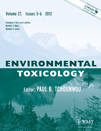
ENVIRONMENTAL TOXICOLOGY
Advancing the Science of Environmental SafetyENVIRONMENTAL TOXICOLOGY, published by Wiley, is a premier academic journal dedicated to the multifaceted study of toxic substances in the environment and their effects on human health and ecosystems. With the ISSN 1520-4081 and E-ISSN 1522-7278, this journal holds a prestigious position in the field, being ranked in the Q1 category across various relevant disciplines, including Health, Toxicology and Mutagenesis, and Management, Monitoring, Policy and Law. The journal regularly publishes high-quality research articles, reviews, and policy discussions aimed at understanding the implications of environmental toxins from 1980 to the present, contributing to the body of knowledge critical for the safety and sustainability of our environment. Researchers and professionals will find a treasure trove of information that not only highlights current trends and methodologies but also sets the stage for future advancements in toxicology. As a key resource, it provides valuable insights necessary for policy-making, environmental management, and public health, reinforcing its significance in the ever-evolving fields of toxicology and environmental science.
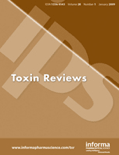
Toxin Reviews
Connecting Researchers to Practical ApplicationsToxin Reviews is a premier academic journal focused on the critical field of Toxicology, published by Taylor & Francis Inc. Established with an aim to foster research and disseminate knowledge, this journal has been pivotal since its inception in 1982 and continues to be a leading platform for both emerging and established researchers. With an impressive impact factor and ranked in the 75th percentile among its peers in the Scopus categories, it serves as an essential resource for scientists, practitioners, and students interested in understanding the complexities of toxins and their effects on health. The journal provides an Open Access platform, enhancing visibility and accessibility of research findings to a broader audience. Covering a wide scope, Toxin Reviews plays a vital role in bridging gaps between toxicological research and practical applications, ensuring that rigorous scientific inquiry translates into real-world solutions.

Food Additives and Contaminants Part A-Chemistry Analysis Control Exposure & Risk Assessment
Exploring the chemistry behind food safety and public health.Food Additives and Contaminants Part A-Chemistry Analysis Control Exposure & Risk Assessment, published by Taylor & Francis Ltd, is a leading journal in the field of food science, toxicology, and public health. With an ISSN of 1944-0049 and an E-ISSN of 1944-0057, this esteemed publication has established itself as a vital resource for researchers and professionals involved in the analysis and regulation of food additives and contaminants. Since its inception and through its converged years from 2008 to 2012 and again from 2014 to 2023, the journal has maintained an impactful presence, notably achieving a Q2 ranking in diverse categories including Chemistry (miscellaneous) and Food Science, alongside commendable standings in Health and Environmental Health. The journal’s mission is to foster high-quality research by providing a platform for critical studies related to chemical analysis, exposure assessments, and risk management in food safety. By prioritizing engaging, peer-reviewed content, it aims to enhance understanding and mitigate risks associated with food additives, making it an indispensable tool for academics, practitioners, and policymakers alike.
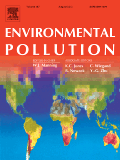
ENVIRONMENTAL POLLUTION
Unveiling the science behind environmental contaminants.Environmental Pollution, published by Elsevier Science Ltd, stands at the forefront of research related to environmental contaminants and their effects on health and ecosystems. With an impressive impact factor reflected in its Q1 rankings across various categories including Health, Toxicology, and Pollution, this journal is a pivotal resource for academics and professionals in the fields of environmental science and toxicology. The journal, established in 1973, continues to disseminate high-quality articles that explore the implications of pollution and advance knowledge on toxicological impacts and mitigation strategies. Although it is not an open-access journal, it offers robust visibility within the scientific community, ensuring vital research reaches those who need it most. Researchers, students, and professionals dedicated to understanding and addressing the challenges of environmental pollution will find Environmental Pollution to be an indispensable platform for their work, guiding the ongoing dialogue on sustainable practices and public health protection.

CHEMICAL RESEARCH IN TOXICOLOGY
Exploring the intricate relationship between chemistry and health.Chemical Research in Toxicology is a premier journal published by the American Chemical Society, dedicated to advancing the understanding of toxicological effects associated with chemical substances. Since its inception in 1988, this esteemed journal has maintained a robust impact factor, ranking in the Q1 quartile for both Medicine (miscellaneous) and Toxicology as of 2023, reflecting its significance and influence in the fields of pharmacology and toxicology. With an impressive Scopus ranking at #16 out of 133 in the Toxicology category, it serves as a vital resource for researchers, professionals, and students seeking cutting-edge insights and scholarly articles that bridge the gap between chemistry and toxicological science. Although not an open-access publication, it continues to provide comprehensive analyses and original research that inform safe chemical practices and regulatory policies, further enhancing its role in public health and safety.

Toxicology Research
Driving innovation in environmental and pharmacological toxicology.Toxicology Research is a distinguished journal dedicated to advancing the field of toxicology through the dissemination of high-quality research. Published by Oxford University Press, this UK-based journal focuses on critical aspects of toxicology and mutagenesis, highlighting both environmental and pharmacological implications. With an ISSN of 2045-452X and an E-ISSN of 2045-4538, it serves as a valuable resource for researchers, professionals, and students alike. Currently categorized in the Q3 quartile for Health, Toxicology and Mutagenesis, as well as Toxicology in 2023, Toxicology Research maintains a visible presence in Scopus rankings, positioning itself within the targeted professional community. Although the journal operates without open access options, its importance in contributing to scientific discussions and policy formation is undeniable. Covering content from 2012 to 2024, it continues to provide insights into contemporary toxicological challenges, thereby fostering interdisciplinary collaborations and informing best practices in health and safety.